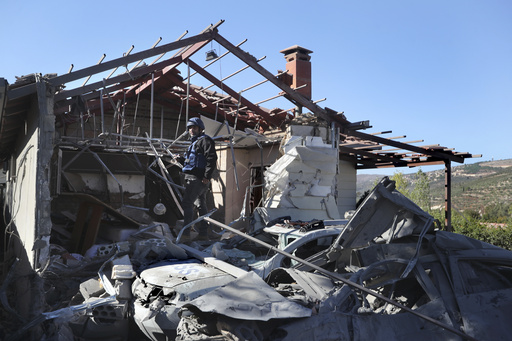
BEIRUT — An airstrike conducted by Israeli forces, which resulted in the deaths of three journalists and injured several others in Lebanon last month, has been classified as a likely intentional assault on civilians, potentially amounting to a war crime, according to an international human rights organization.
The incident occurred on October 25, when the three journalists were attacked while they were asleep in a guesthouse located in southeast Lebanon. This tragic event marks one of the most lethal assaults on the media since the onset of the ongoing Israel-Hezbollah conflict, which has now lasted for over a year.
Lebanon’s Health Minister, Firass Abiad, reported that since the escalation of violence began, a total of eleven journalists have lost their lives, while eight others have sustained injuries. The conflict has taken a heavy toll on the population, with more than 3,500 individuals reported dead in Lebanon alone; among them, over 900 were women and children. Additionally, the conflict has displaced more than one million people due to Israeli ground operations, with Hezbollah responding through the launch of thousands of rockets, drones, and missiles into Israel, prompting significant retaliatory actions from Israeli forces.
According to Human Rights Watch, the Israeli military carried out the airstrike on October 25 using a bomb guided by a U.S.-made Joint Direct Attack Munition (JDAM). The organization urged the U.S. government to halt any weapons sales to Israel, citing systematic “unlawful attacks on civilians” which could implicate U.S. officials in war crimes.
As of now, there has been no immediate response from the Israeli military regarding these assertions. Earlier this year, the Biden administration indicated that Israel’s use of U.S.-origin weapons in its military actions in Gaza may have breached international humanitarian law, although wartime complexities made a definitive assessment challenging.
The journalists who perished in the airstrike included Ghassan Najjar and Mohammed Rida, camera operator and broadcast technician, respectively, for the Beirut-based Al-Mayadeen TV, along with Wissam Qassim, a camera operator for Hezbollah’s Al-Manar TV. Reports indicate that a munition struck a single-story building, detonating upon contact with the floor.
Richard Weir, a senior researcher for Human Rights Watch focused on crises and conflict situations, remarked on the situation, stating that “Israel’s utilization of U.S. arms for unlawful attacks on journalists, particularly those not engaged in any military operations, casts a shadow on both the United States and Israel.” He further expressed concern that the pattern of Israeli military actions against journalists without facing repercussions diminishes prospects for accountability on similar violations in the future.
Humans Rights Watch also confirmed that remnants found at the airstrike site were analyzed and identified as parts consistent with a JDAM guidance kit, which is produced and sold by the U.S. company Boeing. JDAM-equipped bombs are designed to strike targets with precision using satellite coordinates, enhancing their accuracy to within several meters.
In an earlier incident in November 2023, two Al-Mayadeen journalists were killed in a drone strike while covering a story. Furthermore, a month prior, Israeli artillery fire in southern Lebanon resulted in the fatality of Reuters videographer Issam Abdallah and left other journalists from Agence France-Presse and Qatar’s Al-Jazeera critically injured.
